Mishima Plant (SP)
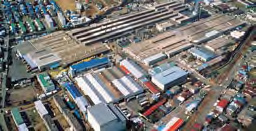
Production of tires for passenger cars, race cars and light trucks
Total site area112,000 m2
Number of employees972 (December 2021)
Location8-1 Minami-Futsuka-machi, Mishima City, Shizuoka 411-0832, JAPAN
Contact for consultation and complaintsMishima Plant Operation Division
Tel: +81-55-975-0800
Fax: +81-55-976-4322
Message from the General Manager
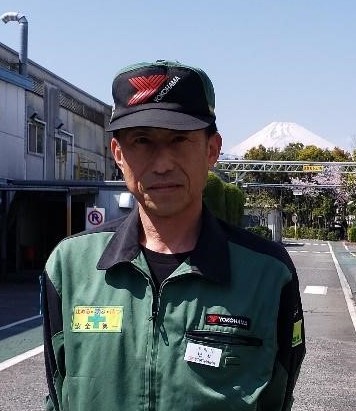
Toshinari Matsumoto
The Mishima Plant is located in Mishima City in the North Izu area of Izu Peninsula UNESCO Global Geopark in eastern Shizuoka Prefecture. Mt. Fuji, a World Heritage site, can be seen to the north from the plant, and the area is blessed with magnificent scenery and bountiful blessings.The plant mainly manufactures tires for passenger cars and light trucks. We are also the only company in the Yokohama Rubber Group that manufactures racing tires for motorsports.
The plant is surrounded by clear water that is part of the natural abundance of Mt. Fuji and the Izu Geopark, and thanks to the tree planting of the Yokohama Forever Forest Project that the Yokohama Group has been engaged in since 2007, it has been possible to see fireflies in the early summer in the tree planting areas in front of the plant in recent years. Meanwhile, residential areas have been developed in the area surrounding the plant as a result of the convenience of the proximity to the Mishima-Futsukamachi Station on the Izuhakone Railway, which means that in addition to control and management of exhaust, drainage, and sound, response to sensory issues such as odors is required, and these are being steadily addressed.
While Yokohama Rubber is aiming to contribute as a member of the global community, the plant is aiming to contribute as a member of the local community.
We would like to foster the abundant natural wealth of the region through participation in clean-up activities around the plant and the Rakujuen section of the Izu Geopark that are currently underway as well as environmental conservation and observation through environmental conservation near the IzuJukan Expressway/Tamazawa IC and biodiversity activities at the Goten River that flows along the west side of the plant.
In FY2021, learning from FY2020, we are continuing the infection prevention measures of COVID-19, promoting work at home, avoiding the 3 secret measures and thoroughly enforcing the basics of gargling, washing hands and wearing masks.
In the future as well, we will work hard to build trusting relationships with all stakeholders in an aim to be a plant that is loved by the region.
Organizational Governance
Corporate Governance and Compliance
The Mishima Plant has also developed its activities in line with Yokohama Rubber's important task of becoming "a company that contributes to the earth, earning the unwavering trust of society. In addition, as a priority issue of reducing environmental risks and contributing to the local community while strengthening the environmental management system, we are deepening communication with stakeholders, preventing environmental pollution and sensory pollution, regularly reviewing past environmental troubles and near misses, and continuously promoting environmental improvement through proactive management.
Corruption prevention
In working to give employees a thorough understanding of our compliance policies as such relate to the prevention of quality fraud, education in compliance issues has been conducted for the entire workforce.
Human Rights
Education on respect for human rights
We distributed “compliance cards” to all employees so as to enlighten and educate them about human rights.
We offer employment irrespective of gender, age or disability.
Promotion of employment of people with disabilities and workforce diversity
Currently, we have 12 employees with disabilities.
As of December 2021, of a total of 682 employees at the plant, 36 are women, and 39 are elderly individuals (persons aged 60 or over).
Labor Practices
Occupational safety and health
Recognizing that securing the safety and health of our employees and employees of partner companies are the foundations of corporate activities, the plant acquired OSHMS (Occupational Safety and Health Management System) certification in November 2010 as a means to realize a safe, healthy and comfortable workplace. We promote safety and health activities by identifying risks through risk assessment activities and reducing risks through countermeasures and improvements, based on 3S activities and KY before work with the participation of all employees.
Employee diversity
In 2021, Zero employees took nursing care leave and 33 employees took parental leave.
Work-life balance
The second and fourth Fridays of even month are designated as “Happy Family Life Days,” and employees are encouraged not to work overtime on these days.
Human resources cultivation and training in the workplace
To enhance the knowledge and skills required of employees, we implement level-based training that is conducted according to years of experience and position. We have made a plan to provide the right training at the right time. In 2021, despite the impact of COVID-19 infection spread prevention measures, we continued to implement thorough infection prevention measures and conducted group training for 26 employees and Mishima Plant's own role-based training for 10 employees, for a total of 36 employees.
The Environment
Environmental management
In line with our principle of “Deal fairly with society and value harmony with the environment”, we declared an environmental policy, adopting the environmental management system of ISO 14001. In order to reduce the environmental burden, we established reducing industrial waste and reducing greenhouse gas emissions as major tasks and actively strive to improve our production process and eliminate energy waste. As regards other measures, we established autonomous management targets to respond to legal regulations and operate within the autonomous management targets.
In response to sensory pollution such as noise, odor, and vibration, three deodorizers are in operation and spraying 24 hours a day during operation as odor countermeasures. We have received cooperation from 28 residents (as of December 2021) living in the four towns surrounding the plant as environmental monitors, and have visited them once a month to report on the situation at their homes and conduct interviews, leading to improvements.
However, in order to prevent the spread of COVID-19, we refrained from visiting them in person. Instead, we refrained from visiting them directly. Instead, we distributed direct mail and CSR reports, and responded to inquiries by phone.
As part of our efforts to contribute to the regional environment, we have planted 29,616 trees (as of December 2021) in the YOKOHAMA Forever Forest Project, which is also a company-wide activity, as well as in a tree-planting event at Otsuchi Gakuen in Otsuchi Town, Iwate Prefecture, and in the "Forest of Hope" seawall in Kakegawa City. However, due to the measures taken to prevent the expansion of COVID-19, we have decided to cancel these activities in FY2021.
A small group of us conducted a tree-planting activity at the Tamazawa Interchange ramp on the Izu-Jukan Expressway under the jurisdiction of the Ministry of Land, Infrastructure, Transport and Tourism.

After tree-growing activities at the Tamazawa Interchange Ramp on the Izu Longitudinal Highway under the jurisdiction of the Ministry of Land, Infrastructure, Transport and Tourism
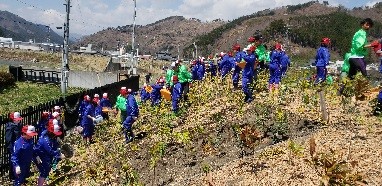
*The event was cancelled due to the prevention of COVID-19 expansion. (The following four photos were taken in fiscal 2019.)
Construction of a seawall in Otsuchi-cho, Iwate Prefecture
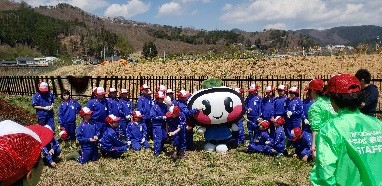
Otsuchi Gakuen Tree Planting Association
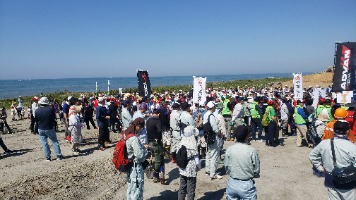
Kakegawa City's "Forest of Hope" seawall
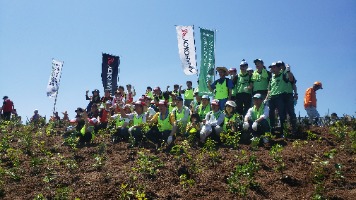
Kakegawa City's "Forest of Hope" seawall
Concerning the protection of biodiversity, we have conducted team surveys of the upper, middle and lower reaches of the Goten River (in our neighborhood). Those activities have involved measurements of water quality, ecological observations being undertaken.
We have observed a wide variety of living creatures live in the river, including dragonfly nymphs (e.g. Calopteryx atrata, Macromia amphigena), fish (e.g. Opsariichthys platypus and Nipponocypris temminckii), reptiles such as Soft-shelled turtle and Chinese pond turtle and the symbol birds of Mishima City, such as Kingfishers, which are rare in a factory surrounded by houses.On the other hand, there is a lot of garbage dumped in the river, and we have been cleaning the river after monitoring in order to contribute in some small way to keep the Goten River beautiful.
However, river vegetation was wiped out by river dredging at the end of 2016, and the diversity of the river disappeared.
Therefore, in May 2019, the Numazu Civil Engineering Office of Shizuoka Prefecture, Mishima City, and the Mishima Plant signed a River Friendship agreement, and in 2020, we conducted activities with government participation twice a year to regenerate vegetation and create a comfortable environment for aquatic life in the Goten River.
In addition, as a result of cleaning up the agricultural waterway in front of the main gate of the plant, fireflies began to inhabit the river in 2012, and a firefly viewing party was held every year in May.
In 2019, we welcomed 281 visitors, but due to measures to prevent the spread of COVID-19 infection, we have decided to cancel the event in 2021. In the future, we intend to build on such biodiversity protection activities.
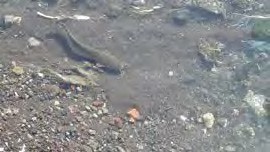
catfish (esp. the Amur catfish, Silurus auratus)
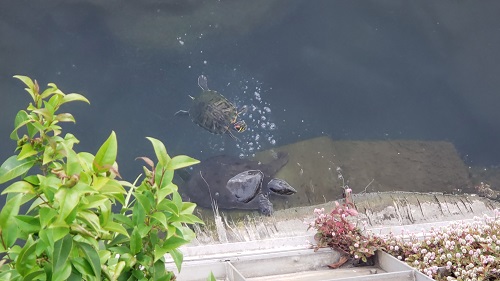
Soft-shelled turtle and Red-eared slider (at the outlet of the final factory drain)
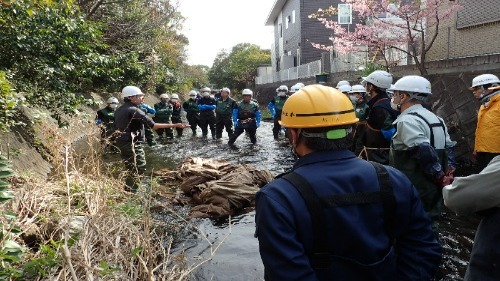
River Friendship 1st Collaborative Activity
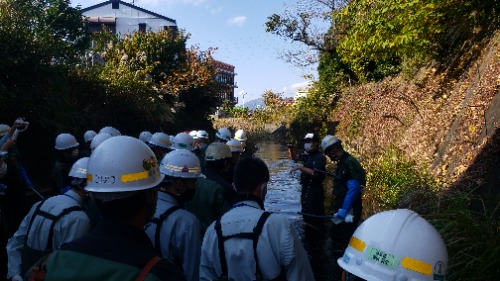
River Friendship 2nd Collaborative Activity
Environmental data
Reductions in greenhouse gas emissions
Greenhouse gas emissions
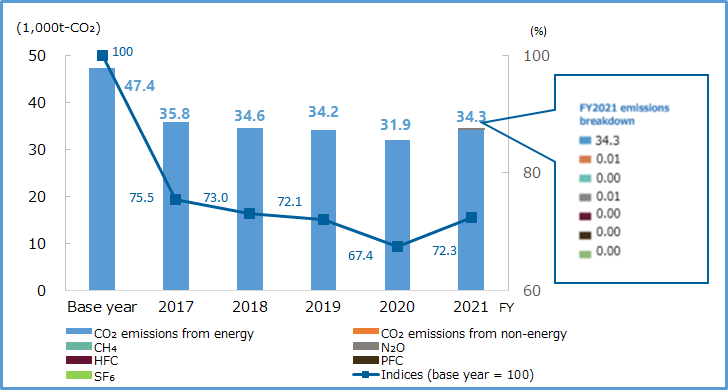
- The base year is deemed as 1990 except for HFC, PFC and SF6, where the base year is 1995 as per the Kyoto Protocol.
- Method of calculation of greenhouse gases (GHG): this is in compliance with the “Calculation and Reporting Manual for Greenhouse Gas Emissions” issued by the Ministry of the Environment and the Ministry of Economy, Trade and Industry.
Note that GHG emissions associated with purchased electric power in FY2009 were calculated using the Table of Emission Coefficients by Power Company (Ministry of the Environment).
Effective use of resources / Reduction of waste
Waste output
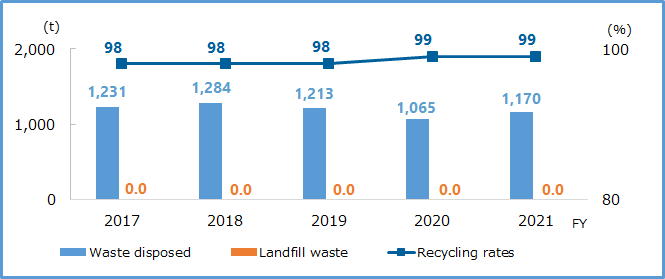
Water usage
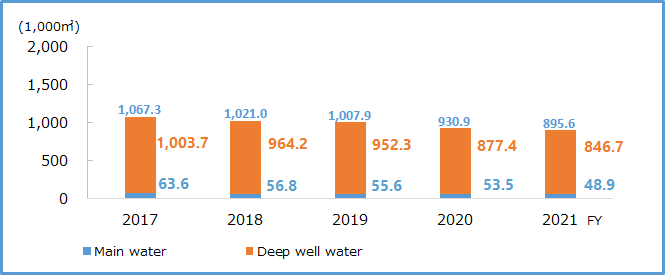
The plant derives 90% of its total water usage from underground water. The remainder is from city waterworks.
Measures for discharge into water, air and soil
Data related to water contamination
The water used at the plant is discharged into the Goten River after being treated in the plant’s treatment facilities.
Move the screen to the left or right to see the table information
| Item | Regulatory values | Voluntary standard values | FY2021 results | ||
|---|---|---|---|---|---|
| Average | Maximum | Minimum | |||
| pH | ※5.8~8.6 | 6.2~8.2 | 7.5 | 7.7 | 7.3 |
| BOD concentration (mg/l) | 15 | 4 or less | 1.5 | 3.5 | 0.5 Less than |
| COD concentration (mg/l) | ★120 | 5 or less | 2.1 | 4.0 | 1.4 |
| SS concentration (mg/l) | 20 | 8 or less | 1.0 | 2.0 | 1 Less than |
| Oil concentration (mg/l) | 2 | 1 or less | 1.0 Less than | 1.0 Less than | 1.0 Less than |
- Agreement on Environmental Protection with Mishima City; Star marks are according to the Water Pollution Prevention Law. (regulatory value of BOD is the max. concentration)
- Discharge point: Goten River
Air pollutants (NOx, SOx)
Move the screen to the left or right to see the table information
| Substance | NOx | SOx |
|---|---|---|
| Amount of emission (t/year) | 20 | ― |
| Facility | Substance | Regulatory values | Voluntary standard values | FY2020 results | ||
|---|---|---|---|---|---|---|
| Average | Maximum | Minimum | ||||
| Mishima Plant Cogeneration |
NOx*1(ppm) Soot and dust (g/m3N) |
100 0.05 |
80 0.01 |
57 Less than 0.001 |
63 Less than 0.001 |
53 Less than 0.001 |
| Mishima Plant Boiler | NOx*2(ppm) Soot and dust (g/m3N) |
130 0.1 |
65 0.02 |
18 Less than 0.005 |
26 Less than 0.005 |
10 Less than 0.005 |
- According to the Air Pollution Prevention Law and recommended values set by Mishima City.
- 1 Data are expressed based on a 16% oxygen content conversion value.
- 2 Data are expressed based on a 5% oxygen content conversion value.
Reporting on chemical substance management status (Pollutant Release and Transfer Register (PRTR) Law compliance)
The Mishima Plant verifies whether secondary materials and auxiliary materials contain chemical substances subject to Safety Data Sheet (SDS) requirements, and in the case of substances where the amounts handled exceed the thresholds specified by the PRTR Law, annual reports are submitted to the national (or prefectural) authorities and safety impact assessment is performed.
Regarding the handling of substances pursuant to the PRTR Law, please refer to the Safety Evaluation Table of Domestic Production Bases.
Fair Operating Practices
Relationship with business partners
In 2021, due to measures to prevent the spread of COVID-19 infection, we did not hold a CSR study session with suppliers, but asked suppliers to conduct a self-diagnosis using the CSR self-check sheet.
- Date: November 19 to December 17, 2021
- Target: All companies (1,223 companies) that had placed orders in 2020
- Seminar contents:
- Respect for human rights and prohibition of discrimination
- Safe and secure working environment
- Environmental protection and maintenance of biodiversity
- Safe and high quality products and services
- Transparent corporate activities and appropriate information disclosure
- Compliance with laws, regulations, and social norms
- Contribution to local communities
- CSR in the supply chain
Based on the results of the self-assessment, we asked each company.We asked each company to apply the results of the self-assessment to their future activities.
Consumer Issues
Communication with customers
To customers who tour the plant, we introduce our acquisition of the Automotive Industry Quality Management System Standard ISO/TS 16949.
Furthermore, in response to inquiries received from customers to whom we have delivered products, we make reports to them based on our quick investigation of the relevant matters.
Community Involvement and Development
Responses to comments and complaints received
We have held plant visits for local residents and environmental monitors twice a year (spring and fall), and explained our environmental initiatives to them. In fiscal 2021, we distributed a CSR report to prevent the expansion of COVID-19. At the Mishima Plant, the Environmental Management Office, as the contact window for regional communication, exchanges views with regional monitors, and in FY2021, we asked for their views 367 times (including 49 dialogues), although we refrained from direct visits. Most of them were related to noise and odor.
Thanks to effective explanations of the Mishima Plant’s environmental measures and a willingness to listen to local residents’ views, in 2021 there were no complaints from local residents.
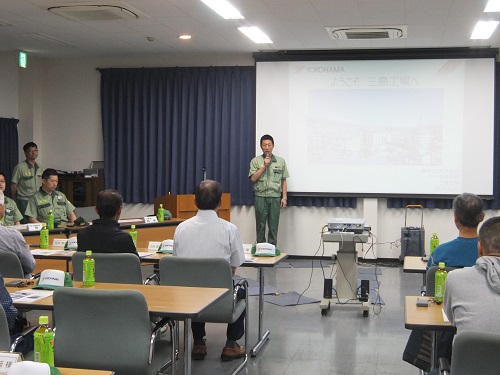
Resident Consultation Meetings with local residents
*The event has been cancelled to prevent the expansion of COVID-19 (Photos were from FY2019)
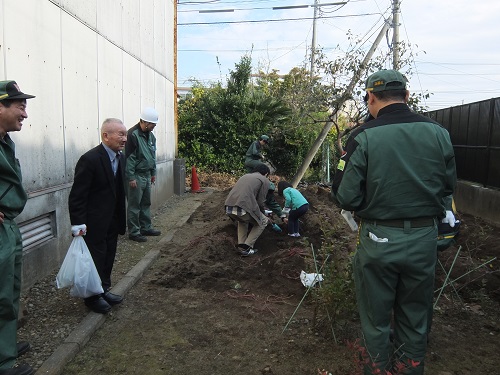
Sweet potato digging
Relationship with local societies
- We used to participate in the annual cleanup service work at Rakujyuen, a public park in Mishima City organized by the Mishima District Environmental Preservation Promotion Council, but it was cancelled in FY2020 to prevent the spread of COVID-19.
- In FY2021, the use of gymnasiums and the premises of dormitories for single employees located within the business sites was also banned from last year as a measure to prevent the spread of COVID-19 infection.In 2021, 0 gymnasiums and 0 bachelor dormitory grounds have been leased to local residents.
- Clean-up activities are implemented in the vicinity of the plant once a week (the area involved extends from the plant’s main gate to the vicinity of Mishima-Futsukamachi Station, and from the main gate to the vicinity of the employee parking lots).
- Blood donations cooperation is held twice a year at the plant, and employees as well as people related to partner companies donate blood; however, in fiscal 2021, we suspended this activity to prevent the spread of COVID-19.
- As a business that cooperates with the fire brigade, seven of our employees are registered with the Mishima City Fire Brigade as special function members. These employees continued to be available to respond to fires in the community.
Plant tours and workshops
In FY2021, we accepted four plant tours, with a total of 35 visitors (down 101 from the previous year) touring the Mishima Plant. After April 2020, the number of visitors dropped to zero due to measures to prevent the spread of COVID-19 infection, but since May 2021, we have resumed plant tours, accepting only those who reside in Shizuoka Prefecture.
Plant Tour Information
When: Plant tours are offered on days on which the plant is in operation (Mondays to Fridays).
Excludes year-end and New Year holidays and the consecutive holiday periods in May and August.
Hours: 8:00 a.m. to 4:00 p.m.
Contact: Mishima Plant, Operation Section Tel: +81-55-975-0800


